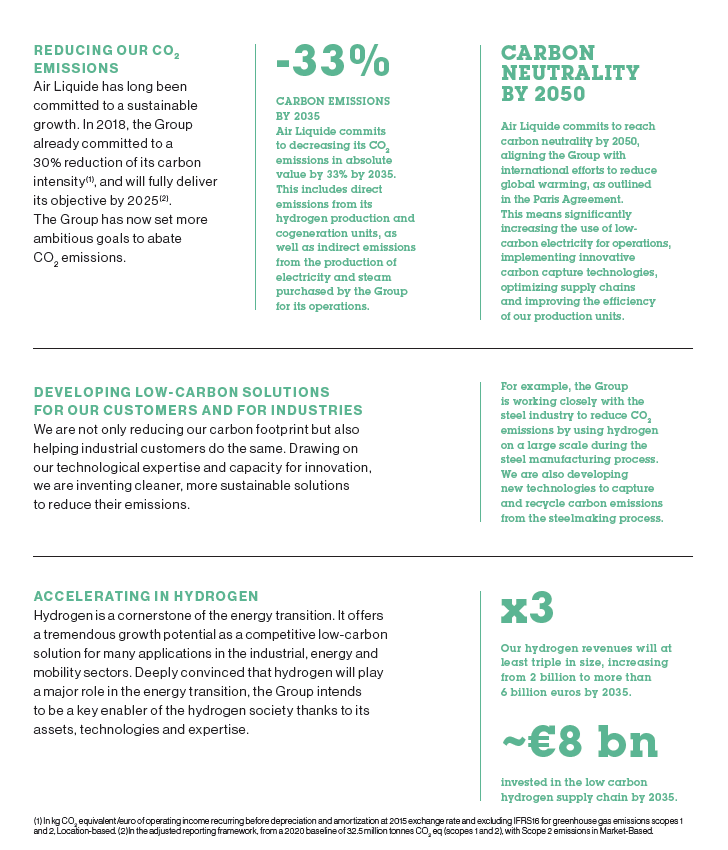We note the Air Liquide announcements of its ESG objectives this week. Industrial gas companies have some of the greatest challenges and some of the greatest opportunities when it comes to clean energy and emission. As the largest producers of hydrogen (from natural gas) they have very large carbon footprints and these are made worse by the power consumption required to run their many air separation units to make oxygen and nitrogen. At the same time, they are the most logical producers of blue hydrogen – using CCS, but most of their existing hydrogen capacity is tied up under long-term contracts with refineries and chemical producers. Making blue hydrogen through capturing the CO2 would only make sense where the primary customer wanted it, or where there was enough slack in the system to free up blue hydrogen to make blue ammonia or to use directly for power generation or transport. Like Linde and Air Products, Air Liquide operates hydrogen grids where there are several consumers in relative proximity – these would seem the most logical places to find meaningful blue hydrogen opportunities and the US Gulf is a more obvious location.
Industrial Gas Companies - Likely to Dominate in Hydrogen
Mar 23, 2021 11:29:43 AM / by Graham Copley posted in ESG, Hydrogen, CCS, CO2
Green Hydrogen - Still Far Too Expensive
Mar 16, 2021 1:15:39 PM / by Graham Copley posted in ESG, Hydrogen, Coal
The cost of the green hydrogen project in Australia listed below is extremely high. Ethylene (a complex petrochemical) is now down to a cost of around $1.00 per pound if built efficiently – which is $2,200 per metric ton of capacity. The hydrogen project linked - if the $0.5bn and the 33,000 metric ton hydrogen capacity are correct, works out at around $15,000 per metric ton of capital costs. To get a 15% return on the project they will need $2,300 per ton of margin, above all operating costs. In the chart below, this would represent a capital charge of more than one dollar per pound, much more than is implied in the green bar. This does not look economic to us and will require either significant government subsidies – or severe penalties on hydrocarbons to make the hydrogen economic on a relative basis. The project does involve selling some power to the grid, but we still struggle to see how this hydrogen can be an economic fuel alternative.
Waste Plastic Prices Rise (But Not For The Right Reasons)
Feb 23, 2021 11:39:33 AM / by Graham Copley posted in ESG, Hydrogen, Recycling
There is a lot of news about plastic waste/scrap prices rising this week. History suggests that we should not extrapolate this into any medium to longer-term conclusions about the longer-term fortunes of recycling. Every time base polymer prices rise above a certain point, companies using plastics with less rigorous product quality requirements start looking for anything they can get their hands on – especially if the supply of virgin resins is physically limited. This was the case when oil prices peaked in 2013/2014 and it was also the case in the early 1980s. The difference today is that a prolonged shortage may help to kick-start some recycling initiatives where consumers find that they can use the lower quality product effectively and choose not to switch back as virgin polymer availability rises because of the PR element of what they have switched to. That said, if virgin prices collapse later in the year, there would almost certainly be some switching back. We have been advocates for some time of a more holistic approach to recycling in the US (and globally) where buyers who want recycled content to accept that they must pay prices based on costs rather than a virgin polymer price marker. Without this, we will not drive the necessary investment to create sustainable and efficient models for recycling that can compete at lower prices.
Wind Power - Volatility and Possible Solutions
Feb 22, 2021 9:18:07 AM / by Graham Copley posted in ESG, Hydrogen, Chemicals, Carbon Capture, Wind Power
Texas wind-based power in February 2021:
Another Case for Carbon Capture
Feb 18, 2021 10:58:26 AM / by Graham Copley posted in ESG, Hydrogen, Chemicals, Carbon Capture





